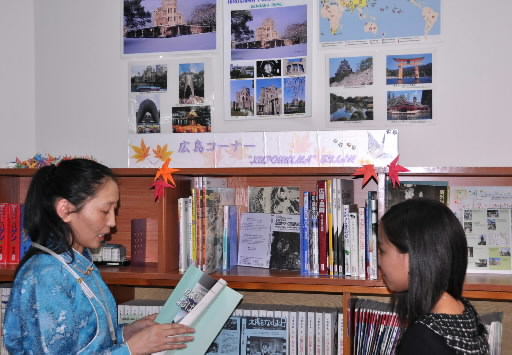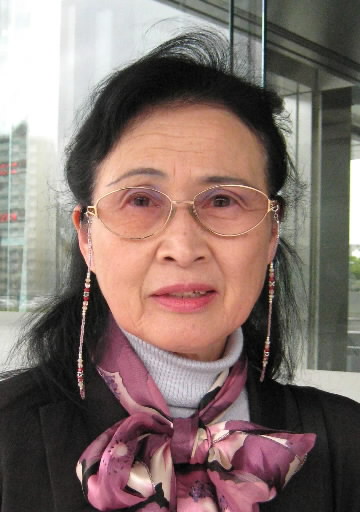Hiroshima-based NGO shares books on Hiroshima with Mongolia
Mar. 17, 2010
by Keisuke Yoshihara, Staff Writer
The "Hiroshima Section" has been created in the library of the Mongolia-Japan Center, located in the Mongolian capital of Ulaanbaator. The "Asian Flower Bouquet," a Hiroshima-based nongovernmental organization (NGO), donated about 40 books and DVDs on the atomic bombing and peace last summer. The organization donated more books this February in its effort to enhance the collection.
The Mongolia-Japan Center was built in January 2002 on the campus of the National University of Mongolia with the financial assistance of the Japanese government. About 25 people, including local staff members and experts dispatched from the Japan International Cooperation Agency (JICA) and the Japan Foundation, are engaged in the operation of the center, which serves as a base for offering Japanese language courses, introducing Japanese culture to Mongolia, and developing human resources for that nation's private sector.
In Mongolia, the interest in Japanese is booming and students pack the library on the first floor of the center's two-story building to study and read. Junko Ogawa, 65, a representative of the "Asian Flower Bouquet" and a Hiroshima resident, learned last May that the center had few books on Hiroshima. With a grant of 200,000 yen from the Hiroshima International Cultural Foundation, she purchased such books as Genbaku no e ("Drawings of the Atomic Bombing") and Shin-chan no sanrinsha ("Shin-chan's Tricycle") and donated them to the center.
In February of this year, Ms. Ogawa sent a total of 75 copies of the Japanese and English versions of Hiroshima no obachan ("One Day in Hiroshima: An Oral History"), in which Nanao Kamada, chair of the board of directors of the Hiroshima A-Bomb Survivors Relief Foundation, wrote about the effects of radiation on the human body. The center plans to distribute the copies to national libraries in Mongolia as well as lending them through the Hiroshima Section of its library.
The staff members of the center expressed their delight, saying, "Paper cranes and Hiroshima are well-known in Mongolia. Even children who don't understand Japanese well pick up a Japanese book and look at it. We are very thankful for the donations." Ms. Ogawa remarked, "I hope that children will study Japanese and learn about the effects of radiation, too."
(Originally published on March 15, 2010)
Related articles
Nuclear weapons can be eliminated: Chapter 3, Part 4 (June 22, 2009)
The "Hiroshima Section" has been created in the library of the Mongolia-Japan Center, located in the Mongolian capital of Ulaanbaator. The "Asian Flower Bouquet," a Hiroshima-based nongovernmental organization (NGO), donated about 40 books and DVDs on the atomic bombing and peace last summer. The organization donated more books this February in its effort to enhance the collection.
The Mongolia-Japan Center was built in January 2002 on the campus of the National University of Mongolia with the financial assistance of the Japanese government. About 25 people, including local staff members and experts dispatched from the Japan International Cooperation Agency (JICA) and the Japan Foundation, are engaged in the operation of the center, which serves as a base for offering Japanese language courses, introducing Japanese culture to Mongolia, and developing human resources for that nation's private sector.
In Mongolia, the interest in Japanese is booming and students pack the library on the first floor of the center's two-story building to study and read. Junko Ogawa, 65, a representative of the "Asian Flower Bouquet" and a Hiroshima resident, learned last May that the center had few books on Hiroshima. With a grant of 200,000 yen from the Hiroshima International Cultural Foundation, she purchased such books as Genbaku no e ("Drawings of the Atomic Bombing") and Shin-chan no sanrinsha ("Shin-chan's Tricycle") and donated them to the center.
In February of this year, Ms. Ogawa sent a total of 75 copies of the Japanese and English versions of Hiroshima no obachan ("One Day in Hiroshima: An Oral History"), in which Nanao Kamada, chair of the board of directors of the Hiroshima A-Bomb Survivors Relief Foundation, wrote about the effects of radiation on the human body. The center plans to distribute the copies to national libraries in Mongolia as well as lending them through the Hiroshima Section of its library.
The staff members of the center expressed their delight, saying, "Paper cranes and Hiroshima are well-known in Mongolia. Even children who don't understand Japanese well pick up a Japanese book and look at it. We are very thankful for the donations." Ms. Ogawa remarked, "I hope that children will study Japanese and learn about the effects of radiation, too."
(Originally published on March 15, 2010)
Related articles
Nuclear weapons can be eliminated: Chapter 3, Part 4 (June 22, 2009)









